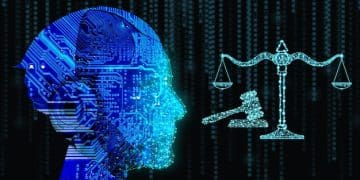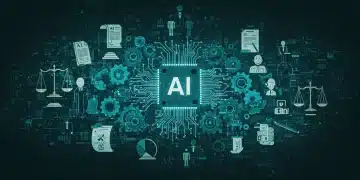AI Ethics: Copyright and Misinformation in the US

The Ethics of AI-Generated Content: Navigating Copyright and Misinformation in the US involves addressing critical issues like copyright infringement, the spread of misinformation, and ensuring transparency and accountability in content creation to protect creators and safeguard the public from deceptive information.
The rise of artificial intelligence has brought about a revolution in content creation, but alongside its benefits come significant ethical challenges. Understanding The Ethics of AI-Generated Content: Navigating Copyright and Misinformation in the US is crucial in today’s digital landscape.
The Rise of AI Content Creation
Artificial intelligence has rapidly transformed content creation across numerous sectors, from media and marketing to education and entertainment. This technological advancement offers unprecedented opportunities, but also raises complex ethical considerations.
Understanding the nuances of AI-generated content is essential for navigating the evolving digital landscape. The automation and efficiency promised by AI tools are reshaping how content is produced and consumed.
The Benefits of AI in Content Creation
AI tools can streamline content creation, making it faster and more cost-effective. These tools can assist in generating various forms of content, including articles, blog posts, social media updates, and even artistic creations.
- Efficiency and Speed: AI algorithms can produce content much faster than humans, enabling rapid content generation and dissemination.
- Cost Reduction: Automating content creation reduces the need for extensive human labor, cutting down on production costs.
- Personalization: AI can analyze data to create personalized content experiences, enhancing user engagement and satisfaction.

Despite these benefits, the use of AI in content creation also presents critical ethical dilemmas. One of the foremost concerns is the issue of copyright, especially when AI models are trained on copyrighted material without explicit permission.
Copyright Concerns
Copyright laws are designed to protect original works of authorship, ensuring that creators have exclusive rights over their creations. However, AI-generated content complicates these protections, raising questions about authorship and ownership.
The legal landscape surrounding AI-generated content is still evolving. Courts and lawmakers are grappling with how to apply existing copyright laws to AI-created works, leading to uncertainty and potential legal challenges.
AI Training and Copyright Infringement
AI models require vast amounts of data to learn and generate content effectively. A common practice is to train these models on datasets that include copyrighted material, such as books, articles, and images.
This practice raises concerns about copyright infringement. If an AI model learns from and replicates copyrighted content, it could potentially violate the rights of the original copyright holders.
- Fair Use Doctrine: The fair use doctrine allows for the limited use of copyrighted material without permission for purposes such as criticism, commentary, news reporting, teaching, scholarship, and research. However, the application of fair use to AI training is still debated.
- Licensing Agreements: Some AI developers seek licensing agreements with copyright holders, allowing them to use copyrighted material for training in exchange for royalties or other compensation.
- Transformative Use: Courts often consider whether the AI-generated content is “transformative,” meaning it adds new expression, meaning, or message to the original material. If the AI-generated content is deemed transformative, it may be considered fair use.
The ambiguity surrounding AI and copyright necessitates ongoing discussions and legal clarification to balance innovation with the protection of creators’ rights. Navigating this complex terrain requires a thorough understanding of current copyright laws and the evolving interpretations related to AI.
Misinformation and Disinformation
AI’s ability to generate convincing and realistic content also opens the door to the spread of misinformation and disinformation. AI-generated fake news, deepfakes, and propaganda can deceive the public, manipulate opinions, and undermine trust in institutions.
The rapid dissemination of AI-generated misinformation poses a significant threat to societal stability. Countering this threat requires a multi-faceted approach involving technological safeguards, media literacy education, and regulatory measures.
The Role of AI in Spreading False Information
AI tools can create highly persuasive fake content, making it difficult for individuals to distinguish between authentic and fabricated information. This capability can be exploited to spread false narratives for political, financial, or social gain.
Deepfakes, for instance, can convincingly impersonate individuals, leading to reputational damage and the erosion of trust. AI-generated propaganda can target specific demographics with tailored messages, amplifying the impact of disinformation campaigns.
- Detecting AI-Generated Content: Researchers are developing AI-based tools to detect AI-generated content. These tools analyze content for telltale signs of AI manipulation, such as stylistic patterns or inconsistencies.
- Promoting Media Literacy: Educating the public about how to identify misinformation is crucial. Media literacy programs can equip individuals with the critical thinking skills needed to evaluate online content.
- Regulation and Accountability: Governments and social media platforms are exploring regulatory measures to hold individuals and organizations accountable for spreading AI-generated misinformation.

Combating AI-generated misinformation demands a collaborative effort involving technology developers, policymakers, media organizations, and the public. By raising awareness and implementing effective countermeasures, society can mitigate the risks associated with AI-driven disinformation.
Ethical Frameworks for AI Content Creation
Developing and implementing ethical frameworks is crucial for guiding the responsible creation and use of AI-generated content. These frameworks should address issues such as transparency, accountability, and fairness.
Ethical guidelines can help ensure that AI tools are used to promote positive outcomes while minimizing potential harms. By adhering to ethical principles, developers, users, and organizations can foster trust and confidence in AI technologies.
Key Principles for Ethical AI Content Creation
Transparency is essential for ensuring that users are aware when they are interacting with AI-generated content. This can be achieved through clear labeling and disclosure practices.
Accountability involves establishing mechanisms for identifying and addressing harms caused by AI-generated content. This requires defining roles and responsibilities for developers, users, and organizations that deploy AI technologies.
- Transparency and Disclosure: AI-generated content should be clearly labeled as such, allowing users to make informed decisions about whether to trust the information.
- Accountability and Responsibility: Developers and users of AI tools should be held accountable for the content they create and disseminate, particularly if it causes harm or violates ethical principles.
- Fairness and Non-Discrimination: AI algorithms should be designed to avoid perpetuating or amplifying biases that could lead to discriminatory outcomes.
Fairness requires that AI algorithms treat all individuals and groups equitably, without discrimination. This involves addressing biases in training data and ensuring that AI models are evaluated for fairness across different demographics.
Legal and Regulatory Landscape
The legal and regulatory landscape surrounding AI-generated content is still in its early stages. Governments and international organizations are exploring ways to address the ethical and legal challenges posed by AI technologies.
Establishing clear legal frameworks is essential for providing certainty and guidance to developers, users, and organizations. These frameworks should balance the need to foster innovation with the protection of fundamental rights and values.
Current Laws and Regulations
Existing laws, such as copyright and defamation laws, can be applied to AI-generated content in some cases. However, these laws may not be adequate to address the unique challenges posed by AI technologies.
Some jurisdictions are considering new laws and regulations specifically tailored to AI. These regulations may address issues such as data privacy, algorithmic bias, and the use of AI in high-stakes decision-making contexts.
- Copyright Law: Existing copyright laws protect original works of authorship, but the application of these laws to AI-generated content is still being debated.
- Defamation Law: AI-generated content that harms an individual’s reputation may be subject to defamation laws, but proving fault and damages can be challenging.
- Data Privacy Laws: AI models trained on personal data must comply with data privacy laws, such as the GDPR in Europe and the CCPA in California.
The evolving legal landscape requires ongoing monitoring and adaptation to ensure that AI technologies are developed and used responsibly. Collaboration between governments, industry stakeholders, and legal experts is essential for shaping effective and equitable legal frameworks.
The Future of AI Ethics in Content Creation
The future of AI ethics in content creation hinges on ongoing research, collaboration, and the development of robust ethical frameworks. As AI technologies continue to evolve, it is crucial to anticipate and address emerging ethical challenges.
By prioritizing ethical considerations, society can harness the transformative potential of AI while mitigating potential harms. This requires a commitment to transparency, accountability, and fairness in the development and deployment of AI technologies.
Emerging Trends and Challenges
One emerging trend is the development of AI models that can generate increasingly sophisticated and realistic content. This raises concerns about the potential for AI to create hyper-realistic fake news and deepfakes.
Another challenge is ensuring that AI algorithms are free from bias and discrimination. Biases in training data can lead to AI models that perpetuate and amplify societal inequalities.
- Hyper-Realistic Content: AI models are becoming increasingly adept at generating realistic content, making it difficult to distinguish between authentic and fabricated information.
- Bias and Discrimination: AI algorithms can perpetuate and amplify biases present in training data, leading to discriminatory outcomes.
- Job Displacement: The automation of content creation through AI could lead to job displacement in some sectors, requiring workforce retraining and adaptation.
Addressing these challenges requires a proactive approach that involves ongoing research, ethical reflection, and the development of effective countermeasures. By embracing a forward-looking perspective, society can ensure that AI technologies are used to promote positive outcomes for all.
| Key Concept | Brief Description |
|---|---|
| 🤖 AI Content Creation | AI rapidly transforms content creation, offering efficiency and personalization. |
| ⚖️ Copyright Issues | Concerns arise from AI models trained on copyrighted material without permission. |
| ⚠️ Misinformation | AI’s capacity to generate realistic content facilitates the spread of misinformation. |
| 🛡️ Ethical Frameworks | Essential for guiding responsible AI content creation, emphasizing transparency and accountability. |
FAQ
▼
The primary ethical concerns include copyright infringement due to AI training on copyrighted material, the spread of misinformation through AI-generated fake content, and biases in AI algorithms that can lead to discriminatory outcomes.
▼
Copyright infringement can be addressed through licensing agreements with copyright holders, ensuring “transformative use” of copyrighted material, and continuously refining AI models to minimize replication of existing works without permission.
▼
Measures include developing AI-based tools to detect AI-generated content, promoting media literacy education to help the public identify false information, and establishing regulations and accountability for spreading misinformation.
▼
The key principles include transparency and clear labeling of AI-generated content, accountability for harms caused by AI, fairness to avoid discrimination, and continuous oversight of AI algorithms to improve their ethical performance.
▼
The legal landscape is evolving through the application of existing laws like copyright and defamation law, and the consideration of new laws and regulations tailored specifically to AI, addressing issues like data privacy and algorithmic bias.
Conclusion
Navigating The Ethics of AI-Generated Content: Navigating Copyright and Misinformation in the US requires a comprehensive approach that includes ethical frameworks, legal clarity, and technological solutions. By addressing these challenges proactively, we can harness AI’s potential while safeguarding creators’ rights and protecting the public from misinformation.





